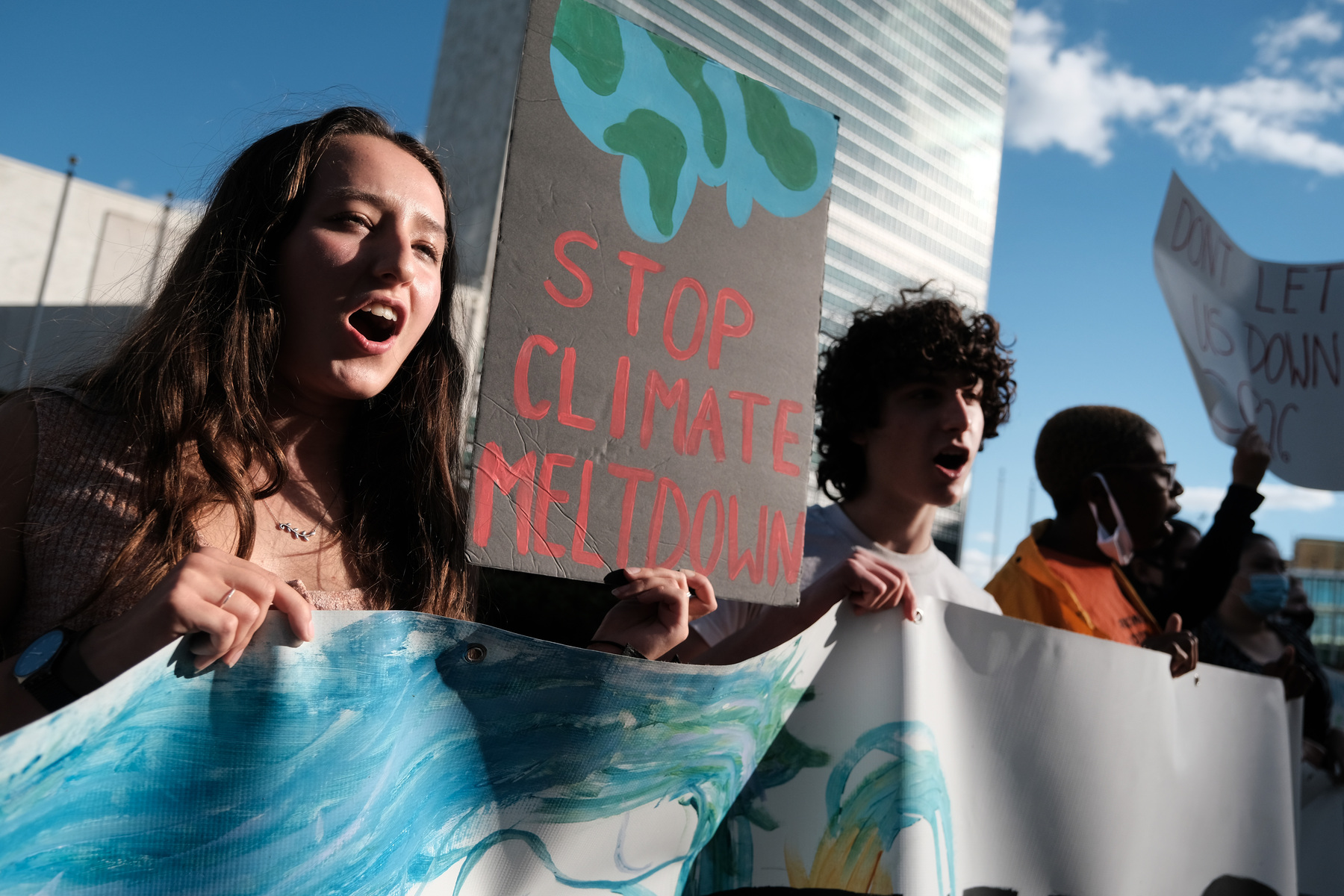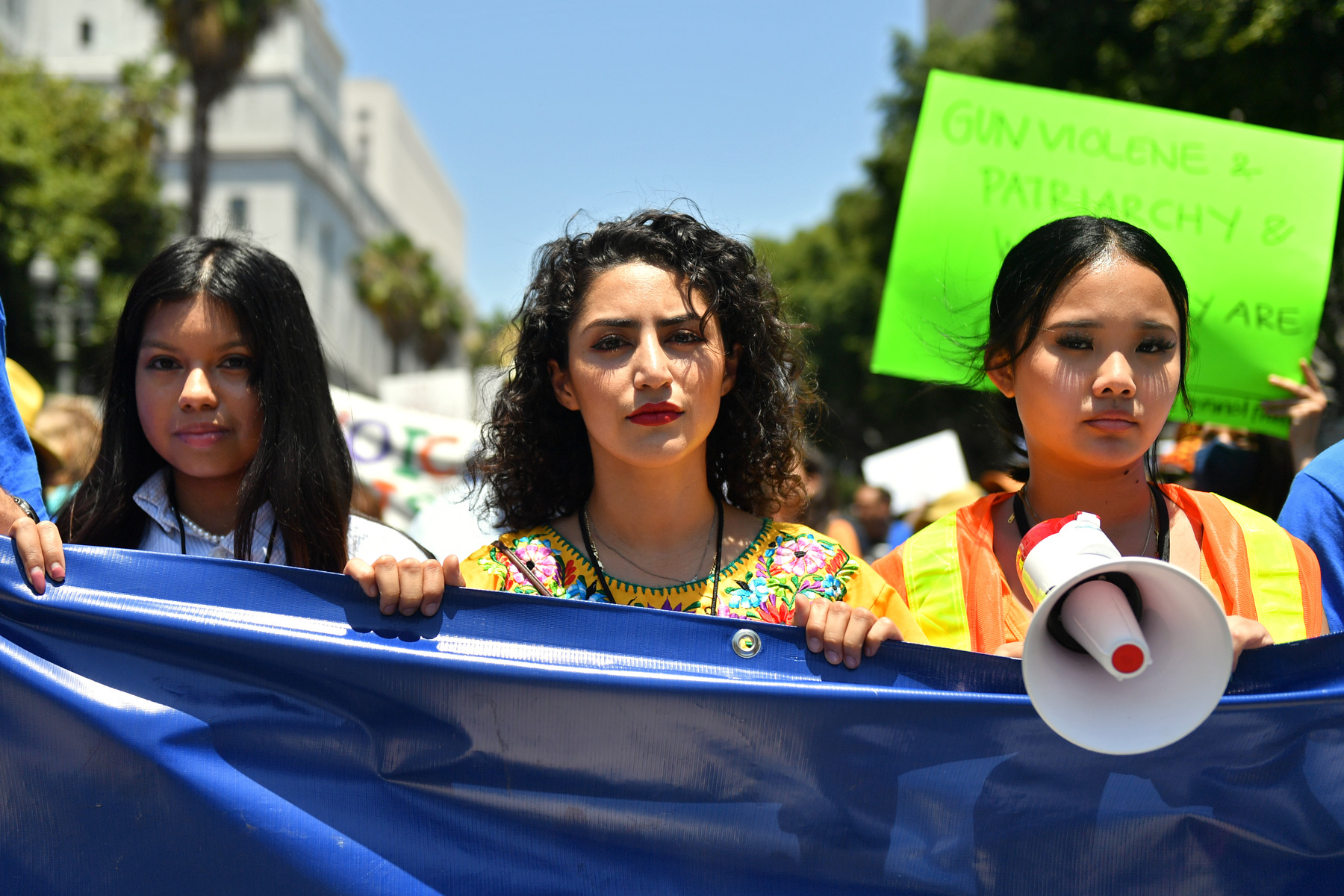Your trusted source for contextualizing Election 2024 news. Sign up for our daily newsletter.
In November, Adah Crandall plans to vote in her first presidential election. There’s no question which candidate she’s supporting: Vice President Kamala Harris.
Crandall, an 18-year-old organizer with the Sunrise Movement, which is made up of young climate activists, said the choice is clear. “I would rather organize under Harris than under a man that … fundamentally doesn’t believe the climate crisis is real.”
Former President Donald Trump has labeled climate change a “hoax,” and his administration rolled back climate protections, while Harris’ decisive vote for the 2022 Inflation Reduction Act allowed the United States to make unprecedented environmental investments. As a senator, she co-sponsored the Green New Deal’s call for a clean energy transition.
Climate change — along with gun violence, immigration reform, Israel’s war in Gaza and reproductive rights — are among young voters’ top concerns. They’re demanding that candidates heed their political interests as they emerge as an influential voting bloc. A record 50 percent of 18-to-29-year-old voters turned out for the 2020 election, backing Biden more than any other age bracket. Two years later, young voters thwarted a potential red wave, helping Democrats pick up another Senate seat. This fall, they’re expected to represent over a fifth of the electorate.
By 2028, people under 40 will constitute a voter majority, according to Erin Heys, policy director and senior researcher for the Berkeley Institute for Young Americans, a research center at the University of California, Berkeley.
Young voters “care more about wealth and power redistribution in society and equal treatment of people from all backgrounds,” she said. “That’s where we see them coming out really strong on issues like Gaza, the border crisis, immigration and wanting more gun control.”
Touting young voters’ growing influence, in March activists with the women-led groups Sunrise Movement, March for Our Lives, Gen Z for Change and United We Dream Action presented their “youth agenda” on Capitol Hill before President Joe Biden’s State of the Union address. Among other policy priorities, the platform demands that the Biden-Harris administration work toward the United States achieving 100 percent clean energy by the year 2035; a permanent ceasefire in the Middle East; stricter national standards for gun ownership; and expanded protections for undocumented immigrants. The groups also cite abortion access as a concern.
“Young people are thoughtful, moral voters,” said Noah Lumbantobing, director of communications for March for Our Lives, a student-led gun control advocacy group. “When you speak to us in a way that aligns with our values, you win our vote. In November, young people are going to be the margin of victory in countless elections. So, the youth vote is not something to be taken for granted.”
Youth continued campaigning for their causes after Biden announced on July 21 that he would not seek reelection, paving the way for Harris to become the Democratic Party’s first woman of color nominee. Harris has reenergized the youth base. A July Pew Research Center poll found that young voters prefer Biden to Trump — 48 to 29 percent. By August, after Biden withdrew, Harris polled even stronger against Trump, at 57 percent. Half of young voters say they’re highly motivated to vote, a 16-point jump since July.
March for Our Lives gave Harris its first-ever endorsement, as she’s visited mass shooting sites and supported gun law reforms. Her emphasis on protecting reproductive rights also appeals to youth, with 61 percent of Harris supporters under 30 telling Pew they’re highly motivated to vote.
Still, she has critics among this bloc. Crandall, a part-time college student in Chicago, wants to push the vice president left on climate and Gaza. During last month’s Democratic National Convention there, Crandall was one of thousands protesting outside the United Center.
“I hope that Democratic Party leaders heard loud and clear that a ceasefire and an arms embargo is popular, that climate action is popular, that we want investments in our communities and our cities and our schools, not in bombs,” Crandall said.
A third of young people sympathize with Palestinians compared with 9 percent of those 65 and older, according to Pew. Moreover, just 16 percent of adults under 30 support U.S. military aid to Israel. While young people rank reproductive rights, gun violence and climate change above their Gaza concerns, the war and related issues like free speech — which colleges have curtailed during protests — are higher priorities for them than student debt, according to a study by the Harvard Institute of Politics, which promotes cooperation between the fields of academics, politics and public affairs.
Harris also faces pressure from activists who want her to adopt a bold climate agenda. In 2019, she supported a ban on fracking, or hydraulic fracturing, a drilling technique in which pressurized fluid is used to extract gas and oil from the earth. Fracking has been linked to pollution, but Harris told CNN on August 29 that she wouldn’t prohibit it if elected. Analysts have described her current stance as an effort to win voters in Pennsylvania, a swing state, and others where energy is a major industry. Similarly, Harris’ representatives haven’t disclosed whether she maintains her support for the Green New Deal.
“There has been no indication that Kamala Harris as president would adopt similar policies that she championed as a senator,” said Zanagee Artis, executive director of Zero Hour, a youth-led climate advocacy group. But, he added, “I think that young people are excited about the prospect that she could represent progressive values and that she could champion climate justice, which is something Gen Z is fighting for.”

He does question whether a Harris administration will wind down fossil fuel production, noting that Biden permitted a lot of oil and gas infrastructure during his tenure, including the Mountain Valley Pipeline, a natural gas pipeline through West Virginia and Virginia. “I think that Kamala Harris is an extension of the Biden administration,” Artis said. “And so that comes with a lot of understanding that they didn’t take on fossil fuels in the way that we would have wanted them to, despite getting progress.”
More must be done to meet the urgency of the climate crisis, he said, so it matters who is in office as activists ramp up the pressure. “I do think that it’s really important for us to think about the conditions under which we want to organize the next four years, and what activism and protest could look like under these two different scenarios.”
To end the gun violence epidemic with which Gen Z has grown up, March for Our Lives is calling on Harris to continue pushing for an assault weapons ban, noting that at the 2020 Presidential Gun Safety Forum the group co-hosted, Harris presented a plan to tackle gun violence that included action from the White House and Congress. The group also applauded her for meeting regularly with gun violence survivors while overseeing the newly-established White House Office of Gun Violence Prevention.
Since 2019, March for Our Lives pressed for the office’s creation to ensure that the federal government responds to gun violence in a cohesive and strategic manner, Lumbantobing said, such as the Department of Education’s launch of a safe gun storage campaign.
“That was a huge victory for us,” Lumbantobing said. Another victory, he said, was the confirmation of a Bureau of Alcohol, Tobacco, Firearms and Explosives director, “who can finally sort of leverage the power of the ATF to make sure that bad actors are held accountable, that we address upstream solutions to gun violence.”
When Harris named Minnesota Gov. Tim Walz as her running mate in August, March for Our Lives praised his teaching background and that after the 2018 school shooting in Parkland, Florida, he called for universal background checks and an assault weapons ban. The group will mobilize young voters for the Harris-Walz ticket and down-ballot candidates, particularly in swing states.
Rosie Couture and Belan Yeshigeta, co-founders and executive directors of the Young Feminist Party, which advocates for the Equal Rights Amendment (ERA), are driven to turn out youth voters, in large part, because of abortion bans.
“We saw, obviously, Roe being gutted two years ago with the Dobbs decision and came close to very scary decisions this past term with Idaho vs. United States and FDA vs. Alliance for Hippocratic Medicine,” said Yeshigeta, a Columbia University junior majoring in history and political science. “So we are very, very concerned about reproductive justice.”
Fifty percent of young voters rank women’s reproductive rights as a top issue, according to the Harvard Institute of Politics. Couture, a Harvard junior majoring in social studies and women, gender and sexuality studies, said that she’s worried about Project 2025’s plan for a national abortion ban, which she calls “terrifying” and potentially “catastrophic.” The Young Feminist Party views the ERA, which would add women’s equality to the Constitution, as the antidote. It would lead to stronger protections, including reproductive freedom, for women and girls, so the organization urges the Biden-Harris administration to instruct the national archivist to finalize the ERA, one of the last steps needed for its addition to the Constitution.
“Vice President Harris has been on record as early as 2019 calling for the publication of the Equal Rights Amendment,” Couture and Yeshigeta wrote in a joint statement to The 19th after Harris became the Democratic nominee. “However, the DNC Platform and 2024 Harris campaign have yet to reflect the vice president’s past record.”
In 2020, Virginia became the last state needed to ratify the amendment, first proposed by women’s suffragists over a century ago, but legal challenges have prevented its adoption.
“We’ve seen the Equal Rights Amendment be a tool to defend and expand abortion access on the state level,” Couture said. “States like Utah that had abortion bans come into place but also had state-level equal rights amendments were able to reverse those bans because their constitutions explicitly prohibited discrimination on the basis of sex.”
The Young Feminist Party is working to get voters in New York, Florida and Arizona to support amending their state constitutions to include abortion rights.
“We’ve already seen these amendments outperform candidates in many states,” Couture said.
Having worked for a reproductive health care organization, a gun violence prevention group and now an immigrant rights group, Michelle Ming has fought for many causes important to youth. Political director of United We Dream Action, the 27-year-old said the immigration system must be overhauled. It took her Chinese immigrant parents two decades to become citizens.
Republicans have been blamed for blocking immigration reform, but Ming said Democrats are increasingly using conservative talking points about immigration. United We Dream co-signed a letter calling out Biden’s use of a pejorative term for undocumented immigrants during his 2024 State of the Union address.
“We don’t believe that border security is necessarily the right way to frame the shortcomings of our immigration system,” Ming said. “What we really want to enforce is a more inclusive country, a more welcoming country, and a safer country for immigrants to be able to thrive.”
But undocumented immigrants — even those with protections under the Deferred Action for Childhood Arrivals Program (DACA) — face barriers. DACA allows undocumented people brought to the United States as children to live, work and study without the threat of deportation if they meet certain criteria. With the policy routinely in court, DACA recipients fear that the limited protections they have will be repealed, Ming said.
“It’s incredibly hard now to be able to renew your DACA status,” Ming said. “People are just kind of in limbo.”
The Biden-Harris administration recently announced plans to help undocumented people educated in the United States obtain work visas more quickly. It also announced the expansion of a federal program to make it easier for immigrant youth to attend college. Republicans, meanwhile, have said they intend to revoke birthright citizenship, require unauthorized immigrants to pay for public K-12 education and prevent states from granting college financial aid to them.
Young voters give Ming hope. She said they helped enact a 2022 Arizona proposition granting in-state tuition to students regardless of citizenship status.
Long stereotyped as apathetic, young voters have been characterized unfairly, Heys contends.
“Young people really get out and vote when there are real solutions to the problems they face in their lives, whether that’s the housing crisis or climate change or gun control or abortion,” she said. “If political candidates come forward with real solutions, we’re going to see young people motivated.”
Jessica Kutz contributed reporting.





